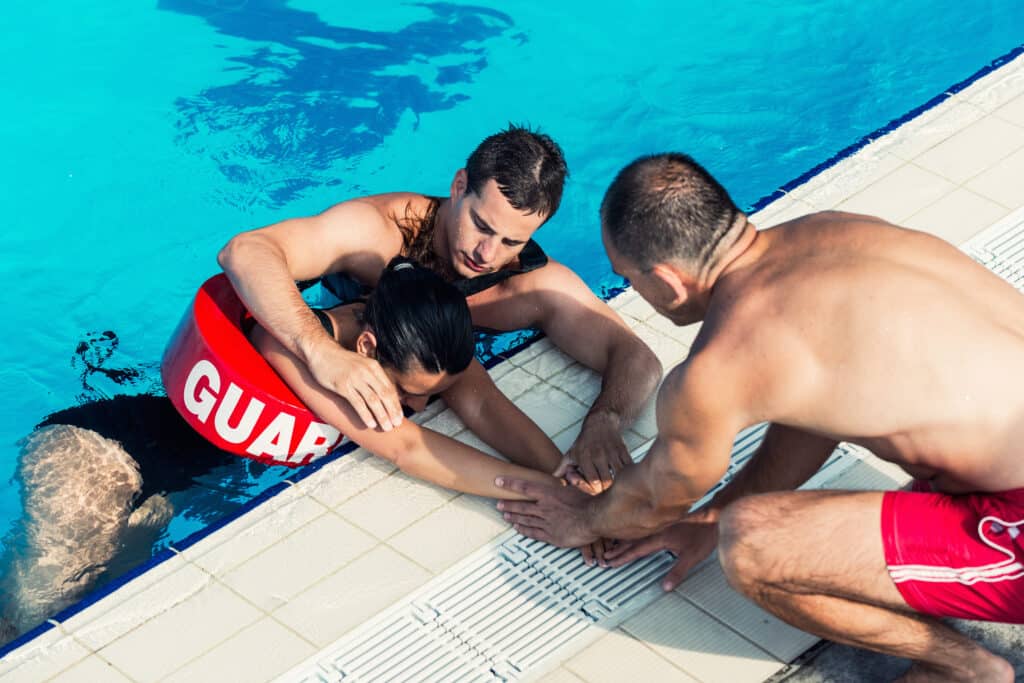Summer is the ideal time to cool off in a pool, but the last thing you want to worry about is a drowning accident. Unfortunately, even the most experienced swimmers can suffer accidents, which is why it’s so important to always have other people around when you’re swimming. Here are some ways that you can help to prevent drowning accidents this summer.

About Drowning Accidents
While the movies may make you believe that if someone is drowning, they’re going to be screaming and splashing and causing all sorts of commotion, the reality is that drowning can happen in seconds and is often silent. Anyone can drown, even the most experienced swimmers. That said, more children between the ages of 1 and 4 die from drowning than any other cause of death.
Drowning injuries can be very serious, resulting in brain damage, long-term disability, and death. During the summer months, drowning rates in the United States increase by almost 90% compared to other times of year. While these facts are scary, drowning is preventable. Knowing how to prevent drowning and proper water safety is key to keeping your summers fun and accident-free.
Preventing Drowning Accidents
We’ll focus on pool safety here, as open water is a whole other beast. That said, similar principles of general safety apply.
#1. Keep Children In Direct Sight
When you’re around water, you need constant eyes on children. You cannot check on them every few minutes like you could normally. Someone always needs to be watching them directly. You also need to use touch supervision if the children are under the age of 4 or do not know how to swim. Touch supervision means staying within arms’ reach of someone.

Children in water or near it can drown silently and immediately, so it is absolutely crucial to never leave children unsupervised, not even for a few seconds. To make this easier on everyone, you can assign a designated person to supervise and ensure that they are relieved every 20 minutes or so.
Adults watching children must keep their full attention on the children and avoid distractions, like phones, books, alcohol, and the like.
#2. Always Check To Pool First If Children Go Missing
With how quickly people, especially children, can drown, you always want to check the water first if a child goes missing. Every second counts in order to save a life.
#3. Keep Rescue Equipment By The Pool
This includes a safety ring, a long pole, and a phone. By having rescue equipment easily accessible, people can act quickly if others get into trouble in the water.
#4. Set Pool Rules
Many drowning accidents can be prevented by following safety tips. Everyone using your pool should know what is and is not acceptable. Some basic instructions you can post by your pool include:
- No running on the pool deck.
- No diving into shallow water.
- No swimming without an adult present.
- No pushing people into the pool.
- No dunking or holding people underwater.
This is by no means a comprehensive list of pool rules.
#5. Take Swimming Lessons
Knowing how to swim can reduce the risk of drowning accidents, and yet, over half of U.S. adults have never taken a swimming lesson. Enroll children in swimming lessons, and consider enrolling in swim lessons yourself in order to improve your skills and comfort in the water.

Even if people know how to swim, supervision is still necessary, especially for children.
#6. Lock It Up
Ensure that your pool has proper barriers around it and keep them locked. Use multiple layers of protection, such as safety covers, gate alarms, door alarms, motion-detectors, and the like. Check out our previous blog on swimming accidents for more information about this and liability related to it here: 5 Important Facts About Swimming Accidents.
#7. Learn CPR
CPR can save lives. Adults should be trained in CPR. You can get CPR certified through many different organizations, such as the American Red Cross, fire departments, and hospitals.
If you do not know CPR, call 9-1-1 in the event of a drowning accident and follow the operator’s instructions until help arrives.
#8. Take Precautions For Medical Conditions

If someone has a seizure disorder or another medical condition that increases their risk of a drowning accident, implement the buddy system and take appropriate precautions. They may need one-on-one supervision around the water.
If someone is on medication that impairs balance, coordination, or judgment, they should avoid swimming as such side effects increase risk of drowning. These medications can be for both physical and mental health conditions.
#9. Don’t Hyperventilate Or Hold Your Breath For A Long Time
Doing so can cause you to pass out and drown. This is also known as “hypoxic blackout” or “shallow water blackout”.
Do You Need A Personal Injury Attorney?
Sometimes, other people’s negligence can result in injury or worse, as can occur with drowning accidents. When that happens, a personal injury attorney can help you obtain justice. LeBaron & Jensen provides personal injury attorney representation in Utah. Contact us today to schedule your free case consultation.
